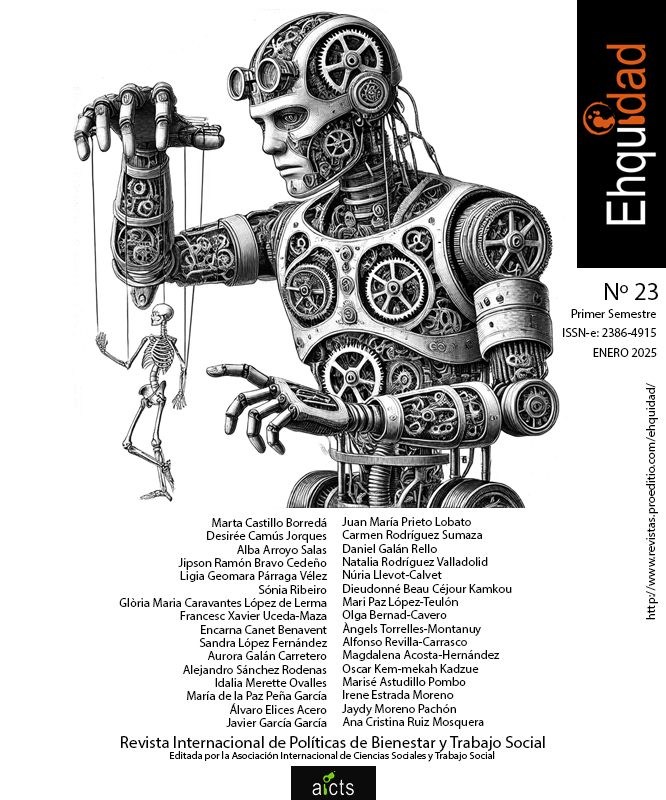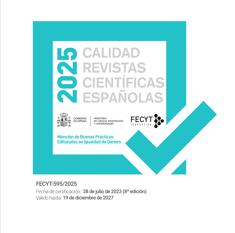Cultural Diversity and Education in Cameroon: Challenges and Opportunities
DOI:
https://doi.org/10.15257/ehquidad.2025.0009Keywords:
Interculturality, Cameroonian school, intercultural management, linguistic diversity, gender perspectiveAbstract
This work is the result of cooperation, research and inter-university transfer, carried out thanks to a grant awarded in 2023 by the Office of Development and Cooperation (ODEC) of the University of Lleida to the annual call for development cooperation projects. This collaboration is not recent, as the faculties of Education of the universities of Yaoundé I (Cameroon) and Lleida (Spain) have been working together for more than ten years with the ultimate goal of improving the training of their students, future teachers and social educators.
Specifically, empirical qualitative work has been carried out with thirty-two young Cameroonians who are studying for their bachelor’s or doctoral degrees in both Spain and Cameroon. As the project is much broader, this article reflects on how the Cameroonian school of the 21st century should be a real space for multicultural encounters, and focuses on such aspects as coexistence, respect for differences, inclusion, the gender perspective, the management of the diversity of ethnic groups, etc. At the same time, it does not ignore that it is necessary to promote cooperation and mutual knowledge of both educational contexts.
Downloads
References
Andrés-Cabello, S., & Giró, J. (2020). Canales y estrategias de la comunidad educativa. EHQUIDAD. Revista Internacional De Políticas De Bienestar Y Trabajo Social, (13), 79-98. https://doi.org/10.15257/ehquidad.2020.0004
Arfuch, L. (2014). Autobiografía, memoria e historia. Clepsidra. Revista Interdisciplinaria de Estudios sobre Memoria, (1), pp. 68-81.
Astudillo, M., Revilla, A., Llevot, N., Bernad, O., Coffi, C., Calvet, Àlvar & Seck, P. (2023). África Joven: arte y diáspora: Una experiencia en la Universidad de Lleida. EHQUIDAD. Revista Internacional De Políticas De Bienestar Y Trabajo Social, (19), 65–102. https://doi.org/10.15257/ehquidad.2023.0003
Aliata, S. (2020). Método autobiográfico para el estudio de procesos identitarios y trayectorias socioeducativas. Revista del CISEN Tramas/Maepova, 8(1), 23-33.
Bella, A. (2015). La problématique du genre dans les universités d’État du Cameroun: entre exclusion i inclusion discriminatoire. Pax Academica, (3), 2337-2575.
Garreta, J., & Llevot, N. (2022). Escuela y familias de origen extranjero. Canales y barreras a la comunicación en la educación primaria. Educación XX1, 25(2), 315–335. https://doi.org/10.5944/educxx1.31840
Kamkou, D., Acosta, M., Llevot, N., Bernad, O., Torrelles, A. & López, M.P. (2024). Educación y atención a la diversidad cultural en Camerún. Ed. Nárcea (forthcoming).
Kem-mekah Kadzue, O. (2012). Estereotipos y globalización: Simetrías y asimetrías entre universitarios cameruneses y catalanes. TFM (Publicada). Máster en Lenguas Aplicadas. Universidad de Lleida. Available at Dipòsit de la recerca de Catalunya. http://www.recercat.cat/handle/10459. 1/48013
Kem-mekah Kadzue, O. (2016). Enseñanza y aprendizaje del español en Camerún: análisis de las creencias del alumnado/profesorado e implicaciones didácticas para una formación competitiva de estudiantes/docentes de ELE. (doctoral thesis). Universitat de Lleida.
Kem-mekah Kadzue, O. (2018). Tic y enseñanza de español en Camerún: creencias del profesorado e implicaciones didácticas. Universidad de Lleida.
Llevot, N., & Garreta, J. (2024): Intercultural mediation in school. The Spanish education system and growing cultural diversity, Educational Studies. DOI: 10.1080/03055698.2024.2329894
Llevot, N., & Bernad, O. (2021). Mediación cultural y prácticas educativas en Italia. Ehquidad. International Welfare Policies and Social Work Journal, (16), 209-246. https://doi.org/10.15257/ehquidad.2021.0020
Martínez, E.F. (2019). El centro y las prácticas de colaboración docente como medios para la mejora educativa. Estudios sobre la Economía Española, 2019/26. FEDEA.
Mba, G. (2013). La diversidad cultural y lingüística en Camerún: un viaje al corazón de un triángulo babélico. Revista Nova África. Barcelona.
Ministère de l’Education de Base (2022). Annuaire Statistique 2020/21. file:///C:/Users/g3850973/Downloads/MINEDUB_Annuaire_statistique_2020_2021.pdf
Mongo, Jeanne Edith Djessi. (2023). La enseñanza y el aprendizaje del español en contacto con el francés y el yemba en Camerún en vista a unas perspectivas pedagógicas. Diss. Universitat de Girona.
Ouane, A., & Glanz, Ch. (2010). Why and how Africa should invest in African languages and multilingual education: an evidence- and practice-based policy advocacy brief. UNESCO.
PASEC (2021). Qualité du système éducatif francophone camerounais: Performances et environnement de l’enseignement-apprentissage au primaire. PASEC, CONFEMEN, Dakar.
Piña-Ferrer, L.S. (2023). El enfoque cualitativo: una alternativa compleja dentro del mundo de la investigación. Revista Arbitrada Interdisciplinaria Koinonía, 8(15), 1-3.
Quinzaños, E. (2019). Aproximación a la situación de plurilingüismo de la República de Camerún: análisis histórico y lingüístico. Universidad del País Vasco.
République du Cameroun (2022). Document Pays. Sommet Mondial sur la transformation de l’éducation. Septembre 2022, New York. https://transformingeducationsummit.sdg4education2030.org/system/files/2022-09/Cameroon_National%20Statement%20of%20Commitment.pdf
Revilla, A. (Coord.) (2022). Formas de maternidad. Diálogos entre maternidades románicas y negroafricanas. Museo de Arte Sacro de Teruel. Servicio de Publicaciones. Universidad de Zaragoza.
Sanz, P. A. (2011). De la educación tradicional africana a la escuela actual en África Subsahariana. Tabanque: Revista pedagógica, (24), 53-67.
Suaréz, T. (2018). Camerún reeligió al ‘eterno’ presidente Paul Biya. France 24. Available at: https://www.france24.com/es/20181022-camerun-reeleccion-presidente-paul-biya
UNFPA (2024). Informe anual del Fondo de la población de las Naciones Unidas. Disponible en: https://www.unfpa.org/es/data/world-population/CM
Vecina, C., Bernad, O., Oliver, M., & Morey, M. (2024). Barreras y facilitadores de la práctica docente en contextos de elevada vulnerabilidad y diversidad etnocultural. Una aproximación desde la relación familia-escuela. Revista Internacional de Organizaciones, (32), 57-80. https://doi.org/10.17345/rio32.455
Worldometers (2024). Cameroon population. Available at: https://www.worldometers.info/world-population/cameroon-population/#:~:text=The%20current%20population%20of%20Cameroon,of%20the%20total%20world%20population












